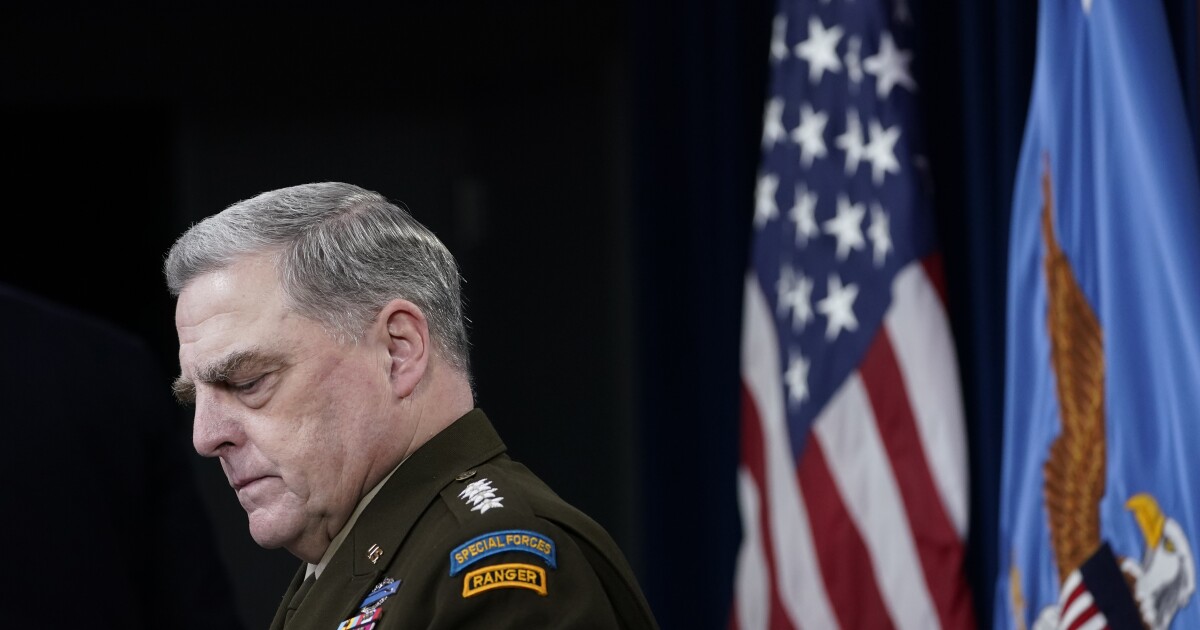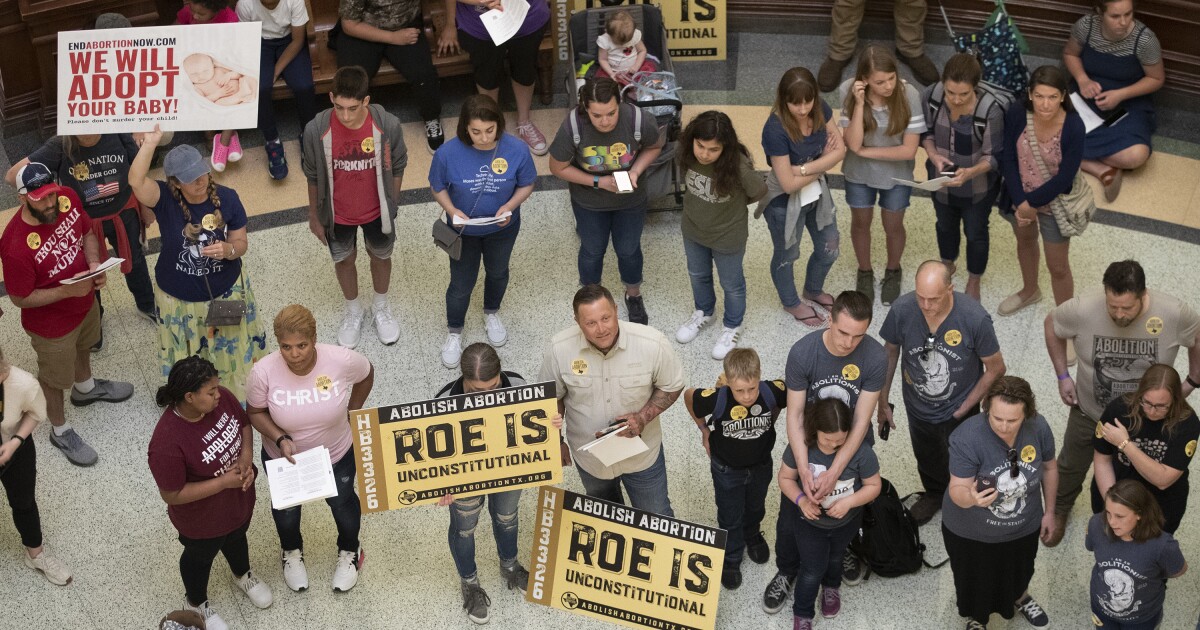‘I prefer to die than to go with’ Taliban: Afghan women face uncertain future

Tamana Bahar was a toddler when the Taliban first ruled Afghanistan. She never felt the militant group’s cruelty, never hid her face. She grew up in a capital that enjoyed the freedoms facilitated by American occupation. But the fear she did not know as a child — the terror her mother knew too well — is threatening the woman she has become.
As Taliban forces approached Kabul on Sunday, Bahar’s mother stayed home from her job at an Afghan ministry, but Bahar insisted on going to work at a government news agency. When her mother cautioned her to wear a burqa and loose clothes in case the extremists seized power, Bahar shrugged off the warning.
“I just laughed and told her, ‘Mother, nothing will happen,’ ” she recalled by phone. “She was right.”
After the Taliban swept through the capital, Bahar rushed home to find armed men filling her street, firing guns and tearing down pictures of women. On Tuesday, Bahar said they ruled the neighborhood and she feared they would soon start searching houses and seizing women for forced marriages or stoning them for minor offenses.
“I prefer to die than to go with them,” she said, but “all the government is in their hands, so how can I escape?”
Afghan women faced an uncertain future this week as U.S. forces withdrew and the Taliban consolidated control after its stunning advance across the nation. Nearly 250,000 Afghans fled their homes in recent months ahead of a Taliban takeover, 80% of them women and children, according to the United Nations’ refugee agency. Women who had traveled to Kabul in recent weeks in search of protection found little in the capital and many returned to Kandahar, Jalalabad and Mazar-i-Sharif. Some women fled with families to the airport; many more hid at home.
Taliban officials who appeared Tuesday on state television and at a briefing in Kabul said women’s rights would be respected within the boundaries of sharia, or Islamic law. The fundamentalist group ruled the country for five years until the 2001 U.S.-led invasion, denying girls an education and women the right to work, as well as refusing to let them travel outside their homes without a male relative. There have been no confirmed reports of the Taliban imposing such restrictions in areas it recently seized, but militants were reported to have taken over houses and set fire to at least one school.
A few women in Kabul gathered to protest Tuesday, and an Al Jazeera correspondent tweeted video with the caption, “Taliban: We want our rights, we want social security, the right to work, education and political participation.”
Many remain concerned about women’s rights under the Taliban, including Nobel Peace Prize laureate Malala Yousafzai, who was shot in the head by Taliban gunmen in 2012 while demonstrating for women’s rights in Pakistan.
“We watch in complete shock as Taliban takes control of Afghanistan. I am deeply worried about women, minorities and human rights advocates,” Yousafzai wrote on Twitter, adding, “Global, regional and local powers must call for an immediate ceasefire, provide urgent humanitarian aid and protect refugees and civilians.”
Several U.S. groups are assisting Afghan women trying to leave the country, including the New York-based nonprofit International Refugee Assistance Project. They plan to hold a briefing Wednesday with an Afghan women’s rights advocate whom they helped file a petition for protection with the U.S. State Department after she was left out of the evacuation effort despite having worked on U.S. projects.
Some women still in Afghanistan on Tuesday said they did not trust the Taliban given the militants’ track record of human rights violations.
“They are just saying that to the world so the world believes … that they are changing,” Bahar said of the Taliban spokesman’s comments, recalling how the group made death threats against her until she quit her job at a magazine in 2017.
She said that when she tried to go outside Monday, armed Taliban fighters told her to stay inside even though she was wearing a burqa.
“They are not the kind of people where you can reason with them. You can’t say anything to them or they will kill you,” she said. “There is no person, no country, to defend us.”
Her father teaches at a high school that has been closed since the Taliban takeover. The militant group has said it will not enter homes or seize property, but Bahar and other women said fighters in their neighborhoods told them they would start house-to-house searches soon. She fears they will be looking for those who worked for the government, especially female journalists.
“They are saying they will start with our house,” she said, which she shares with her parents and siblings. “All members of my family are at risk just because of me.”
Bahar knows women who have left for India and Pakistan, but now their embassies in Afghanistan are closed, visas and flights scarce. She said that her parents are supportive but that there’s little they can do to protect her.
“They are just telling me find a way to escape the country because if they find you, they will kill you and they will kill all of us,” she said, but “all the government is in their hands, so how can I escape?”
Other Afghan women said their conservative families were already pressuring them to abandon their jobs and agree to arranged marriages.
“They said for me that you must marry,” said Samira, a women’s rights activist who asked to be identified by her first name because of security concerns.
“I’m crying and afraid. I feel broken,” she said in WhatsApp messages Tuesday, describing her future under the Taliban as “dark.”
Samira, a women’s rights activist in Afghanistan, described her future under the Taliban as “dark.”
She asked to not be identified because of security concerns.
(Samira)
Samira, 32, said that as she fled for home from her office on foot Sunday, wearing a suit without a head scarf, she was confronted by Taliban fighters.
“You are over!” she heard them shout as they told her to go home.
She hid with her family, deleting her photos from social media in case the Taliban was looking for targets.
“I’m struggling to find any way to protect myself,” she said.
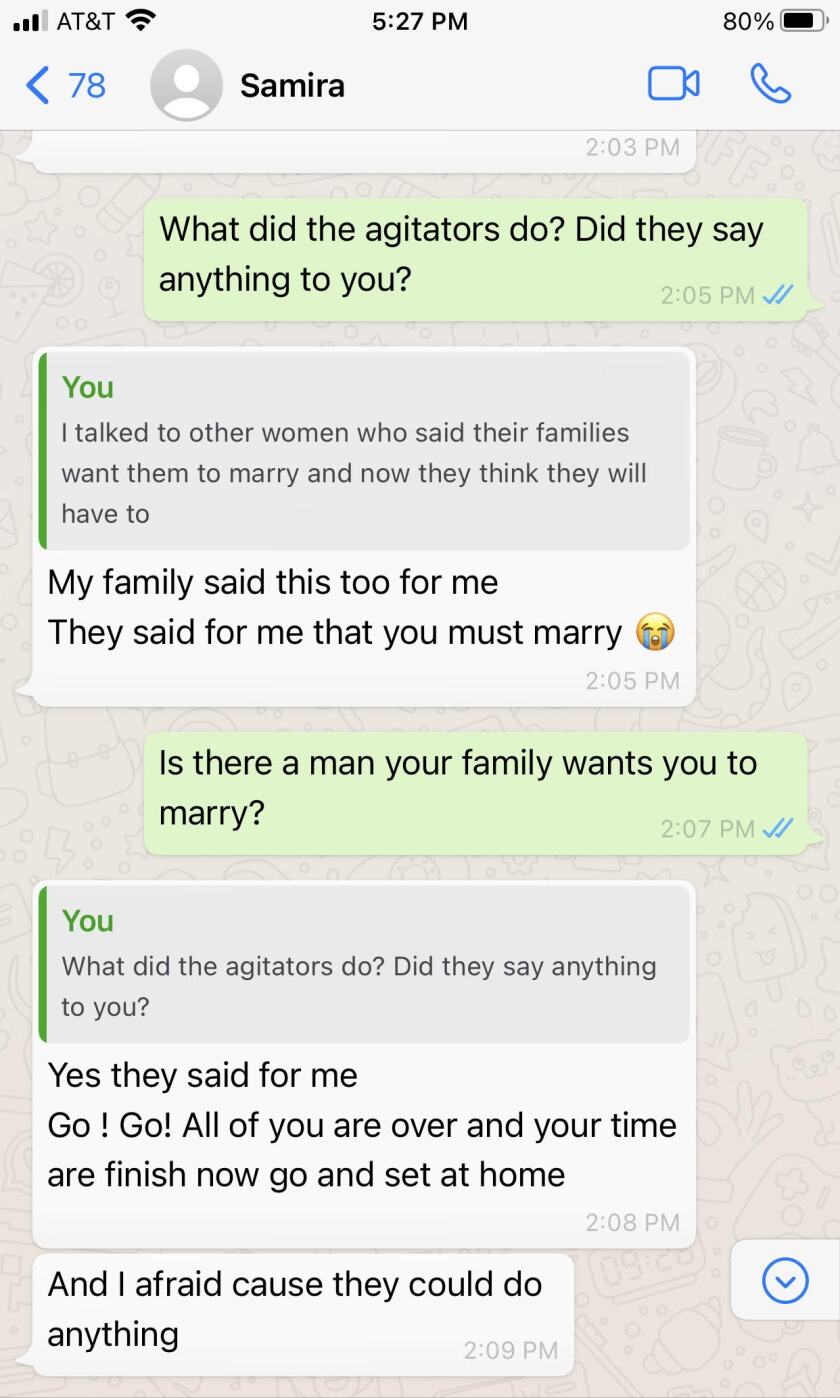
WhatsApp messages from Samira in Afghanistan on Aug. 17, 2021.
(Molly Hennessy-Fiske / Los Angeles Times)
Latifa Ainy, an activist who worked at a government ministry, also removed photos of herself from Facebook and WhatsApp in hopes of appeasing the Taliban, replacing them with photos of her children.
“All the women are staying at home. They can’t go outside and they are very worried about themselves — what can they do in the future? What will be their work?” said Ainy, 39.
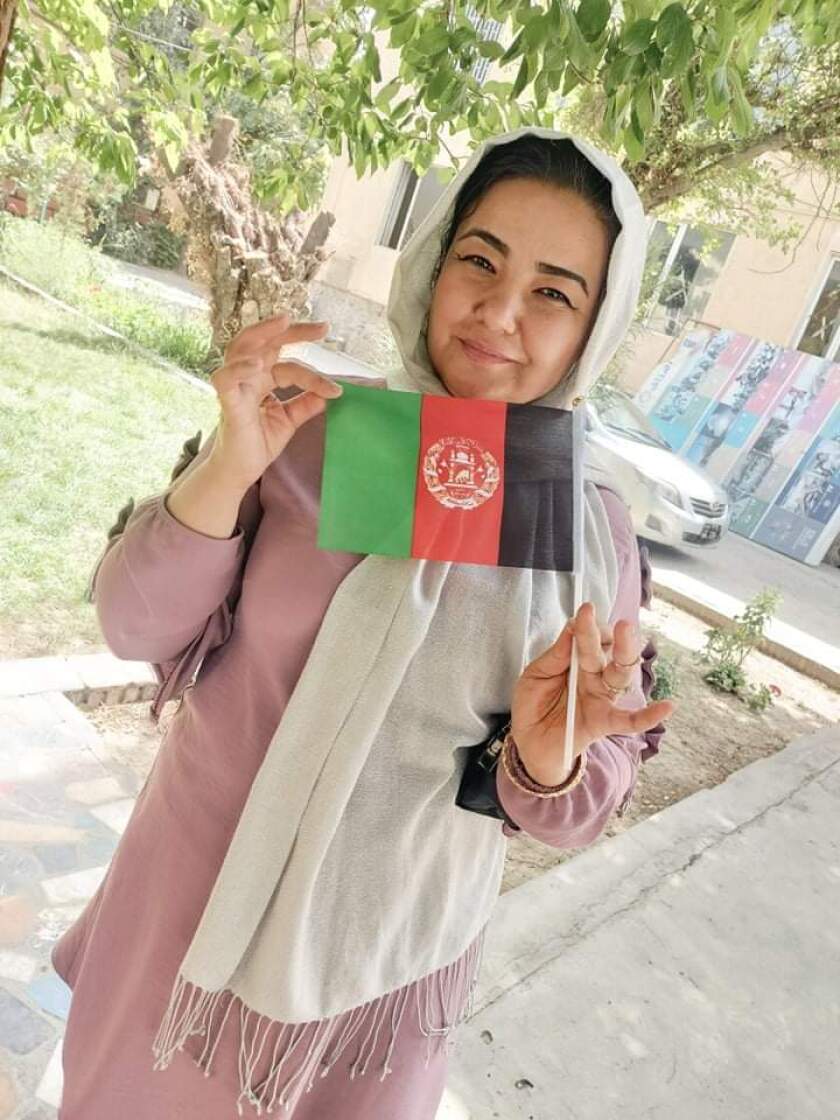
Latifa Ainy, an Afghan activist and government worker, holds an Afghan flag.
(Latifa Ainy)
On Monday, she watched Taliban fighters approach her family’s apartment building to seize Land Rovers and other luxury cars from a nearby parking lot. If drivers refused, they beat them, injuring some, she said.
Her daughters — Nigina, 12 and Tahmina, 8 — were home from school indefinitely. Ainy was not sure how she would feed them. She and her husband, who also worked for the government, don’t know whether they will be paid this month.
They have relatives in Germany and Turkey but don’t know how they would get there. She said relatives who went to the Kabul airport this week were turned away.
“I don’t know what will happen to me, to my job, my life,” Ainy said. “I think about my daughters, the future of my daughters.”
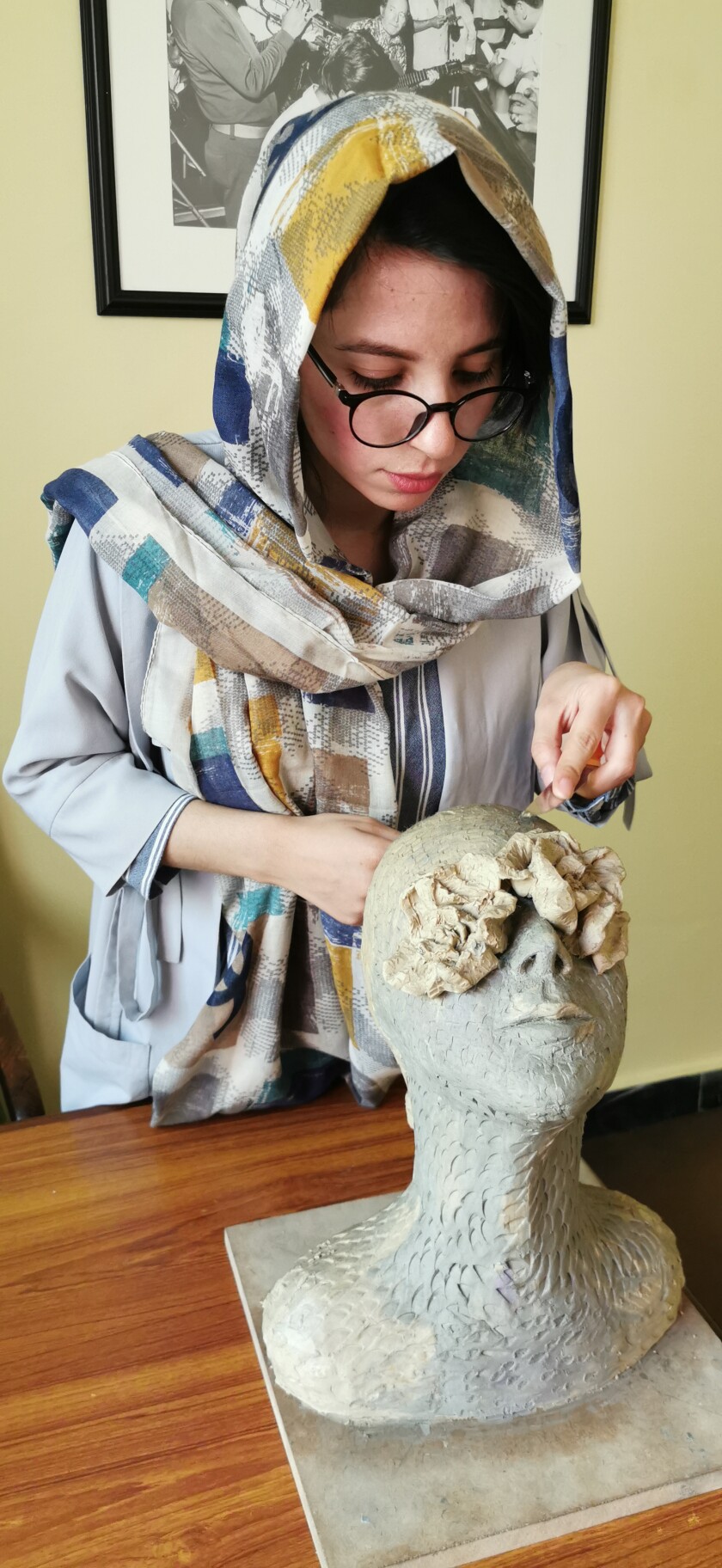
Afghan artist Basira Shahnawaz is fearful about Taliban rule.
(Bashira Shahnawaz)
Artist Basira Shahnawaz has worked with a U.S. Agency for International Development painting project for the last eight months, but because it was administered by Afghan officials, she said her application for a U.S. special immigrant visa was refused last week, despite a recommendation from a U.S. professor at Kabul University where her husband teaches piano.
“With the arrival of the Taliban, fear took over my whole being and all my achievements perished,” Shahnawaz, 25, said via WhatsApp on Tuesday.
She considers herself a women’s rights activist who resisted pressure from her conservative family, earned a master’s degree in visual and performing arts from Kabul University and opened a gallery where she displayed her drawings and paintings. The Taliban has a history of using sharia to destroy art and silence artists, she said. Already, she said the militants have made black burqas mandatory in her part of Kabul.
“I have fought for freedom, I have fought for the right to continue my education. I have fought for many years for many small things that were my religious and human right against my father and brother,” Shahnawaz said. “But today I am sitting at home and looking at the door and the wall in despair…. We do not even have relative freedom now. All our authority depends on men. They decide for us whatever they want.”
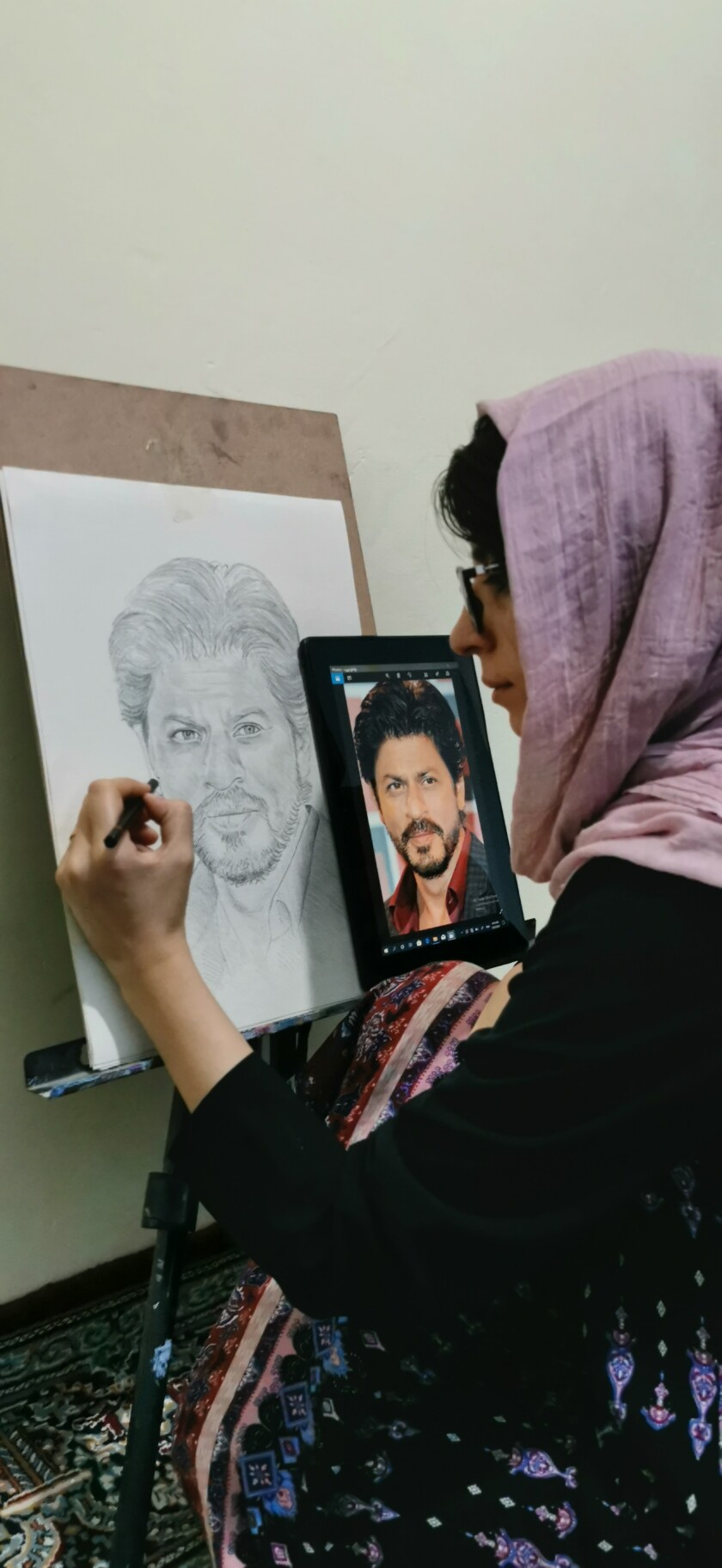
Afghan artist Basira Shahnawaz fought for the right to study and create art.
(Basira Shahnawaz)
She called on U.S. officials to help women who want to leave the country or stay and get an education.
“Afghan women need support,” she said, otherwise “all the values of the last two decades will be destroyed and all the losses will be on women.”


